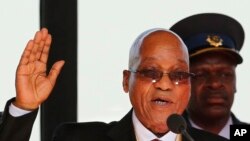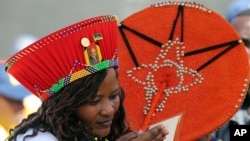JOHANNESBURG —
South African President Jacob Zuma was sworn in for a second five-year term Saturday at a pomp-filled event attended by thousands from across the country, with dozens of foreign dignitaries from around the African continent also on hand.
But on the streets, South Africans expressed mixed opinions about five more years in office for a leader who has been embroiled in corruption scandals since first taking office.
Zuma took his second oath of office during a spectacular and colorful ceremony at the Union Buildings in Pretoria, as dozens of sitting heads of state, over 100 ambassadors and thousands of South Africans observed.
The president began his second term after his ruling African National Congress party’s decisive 62 percent win in national elections May 7.
The official ceremony began with Zuma taking the oath of office in front of the country’s chief justice, Mogoeng Mogoeng. He vowed to “be faithful to the republic of South Africa, so help me God.”
The military paid tribute with a 21-gun salute and a series of aircraft flyovers, demonstrating its readiness to protect the president and the nation at large.
In his inauguration speech, Zuma said his second term would “involve the implementation of radical social-economic transformation.”
A scandal-plagued first term
Zuma began his final term in the midst of scandals. Parliament is set to consider a report that alleges millions of dollars in state funds were used for developments at his private rural Nkandla home.
The official opposition party, the Democratic Alliances (DA), is fighting for the reinstatement of over 800 charges of corruption, tax evasion and money laundering against Zuma. These had been dropped.
But Zuma’s ruling ANC government has delivered free houses, education, electricity and social grants to millions of the nation’s poor.
His inauguration attracted mixed reactions from South Africans.
Elizabeth Baleni, who did not bother to attend the inauguration ceremony, said Zuma’s second term in office spells doom for South Africa: “This will mean more money spent for his private businesses, more wives at the expense of the state and more corruption for him and his colleagues, more unemployment for youth and a whole lot of things.”
But others have showered praise on Zuma, saying his pro-poor policies have reduced poverty by a wide margin.
A choice for continuity
Sam Mthethwa, 29, said re-electing Zuma was the right thing to do.
“I believe Zuma’s installation will mean continuity,” Mthethwa said, adding it would give the president a chance to complete programs such as a national development plan.
Roger Southall, a sociology professor and political analyst at Johannesburg’s Witwatersrand University, told VOA that Zuma faces a number of challenges.
His second term “could be quite stormy,” Southall said. “II think we will see a continuation of the extensive protests around the country, a mixture of economic growth and continuing political difficulties.”
Many say the ball is now in Zuma’s court to prove his critics wrong.
But on the streets, South Africans expressed mixed opinions about five more years in office for a leader who has been embroiled in corruption scandals since first taking office.
Zuma took his second oath of office during a spectacular and colorful ceremony at the Union Buildings in Pretoria, as dozens of sitting heads of state, over 100 ambassadors and thousands of South Africans observed.
The president began his second term after his ruling African National Congress party’s decisive 62 percent win in national elections May 7.
The official ceremony began with Zuma taking the oath of office in front of the country’s chief justice, Mogoeng Mogoeng. He vowed to “be faithful to the republic of South Africa, so help me God.”
The military paid tribute with a 21-gun salute and a series of aircraft flyovers, demonstrating its readiness to protect the president and the nation at large.
In his inauguration speech, Zuma said his second term would “involve the implementation of radical social-economic transformation.”
A scandal-plagued first term
Zuma began his final term in the midst of scandals. Parliament is set to consider a report that alleges millions of dollars in state funds were used for developments at his private rural Nkandla home.
The official opposition party, the Democratic Alliances (DA), is fighting for the reinstatement of over 800 charges of corruption, tax evasion and money laundering against Zuma. These had been dropped.
But Zuma’s ruling ANC government has delivered free houses, education, electricity and social grants to millions of the nation’s poor.
His inauguration attracted mixed reactions from South Africans.
Elizabeth Baleni, who did not bother to attend the inauguration ceremony, said Zuma’s second term in office spells doom for South Africa: “This will mean more money spent for his private businesses, more wives at the expense of the state and more corruption for him and his colleagues, more unemployment for youth and a whole lot of things.”
But others have showered praise on Zuma, saying his pro-poor policies have reduced poverty by a wide margin.
A choice for continuity
Sam Mthethwa, 29, said re-electing Zuma was the right thing to do.
“I believe Zuma’s installation will mean continuity,” Mthethwa said, adding it would give the president a chance to complete programs such as a national development plan.
Roger Southall, a sociology professor and political analyst at Johannesburg’s Witwatersrand University, told VOA that Zuma faces a number of challenges.
His second term “could be quite stormy,” Southall said. “II think we will see a continuation of the extensive protests around the country, a mixture of economic growth and continuing political difficulties.”
Many say the ball is now in Zuma’s court to prove his critics wrong.





